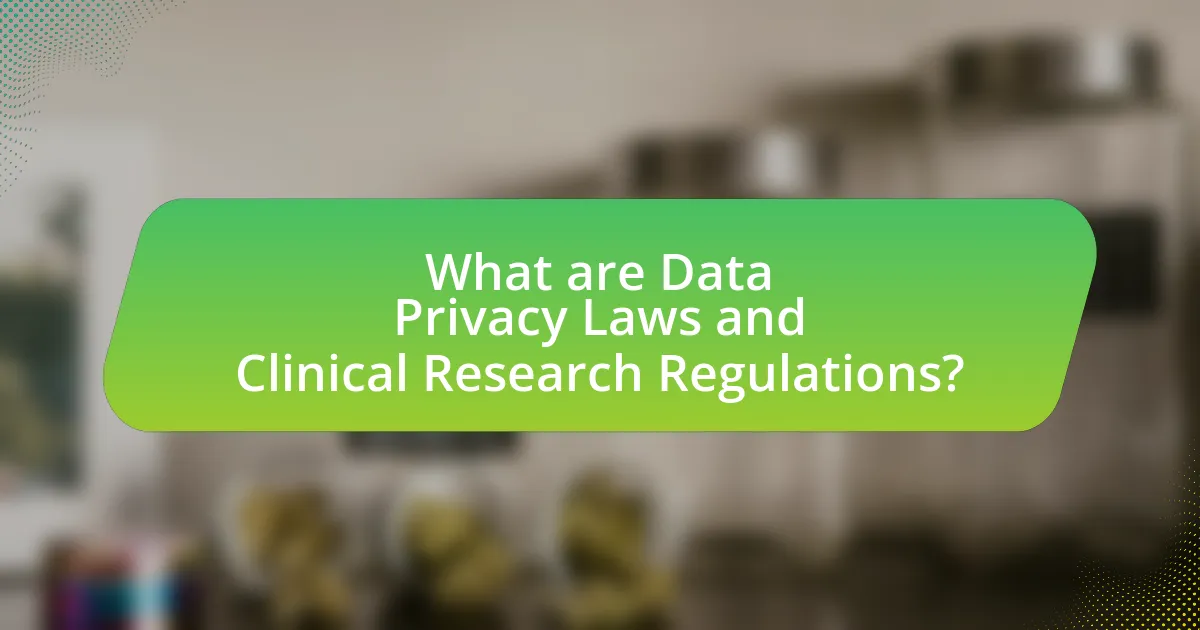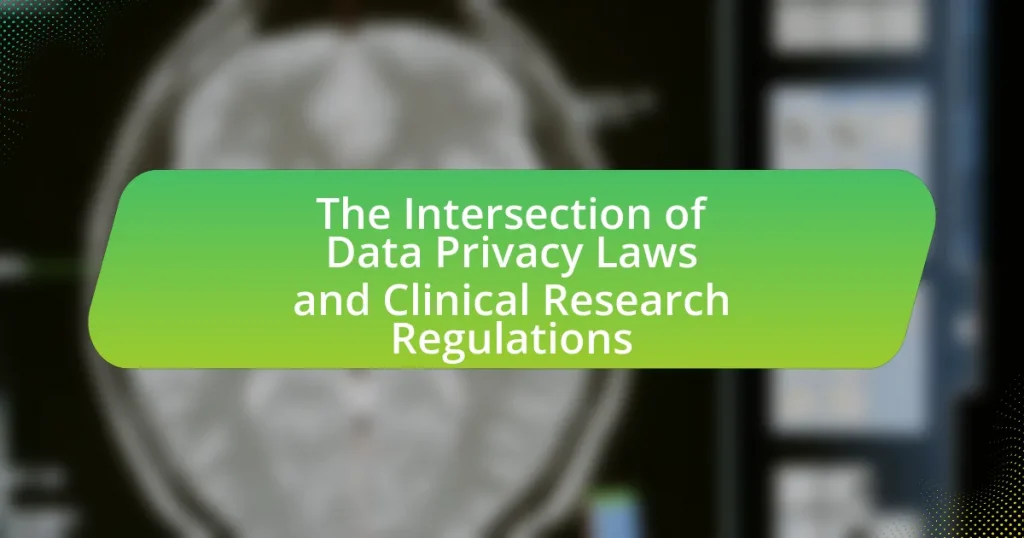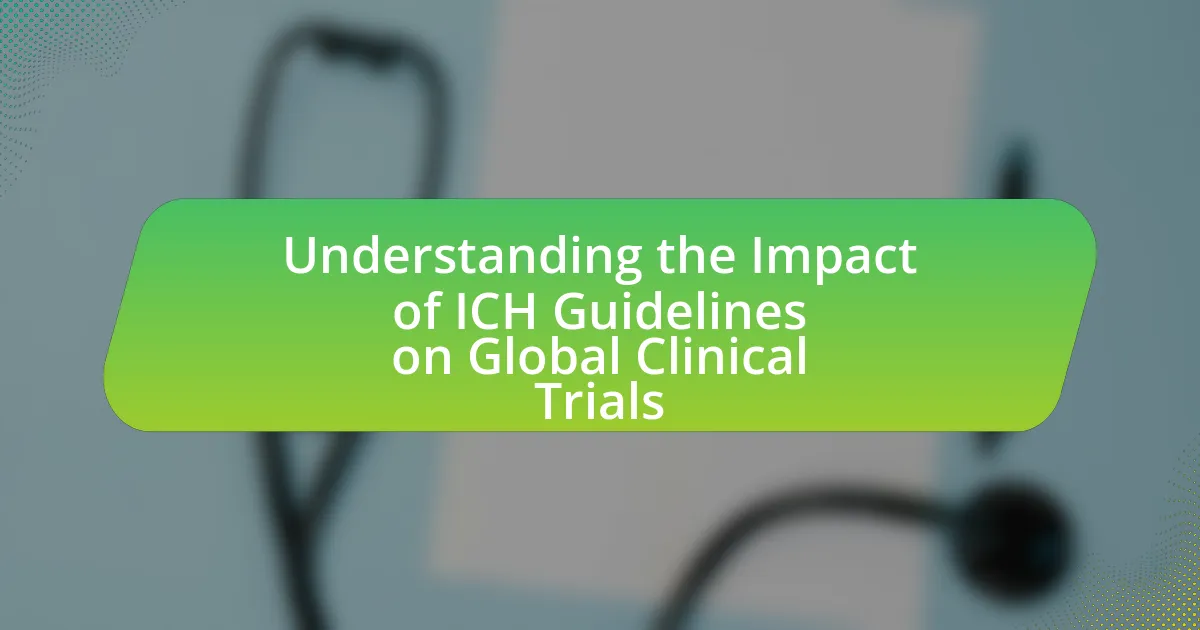The article focuses on the intersection of data privacy laws and clinical research regulations, highlighting their significance in protecting personal information and ensuring ethical research practices. It outlines key data privacy laws, such as the General Data Protection Regulation (GDPR) and the Health Insurance Portability and Accountability Act (HIPAA), and their impact on clinical research, including the necessity for informed consent and data minimization. The article also discusses the challenges posed by conflicting regulations, the importance of compliance, and best practices for navigating these legal frameworks to safeguard patient information while conducting research. Additionally, it addresses the role of technology in enhancing compliance and the future trends that researchers should be aware of in this evolving landscape.

What are Data Privacy Laws and Clinical Research Regulations?
Data privacy laws are legal frameworks designed to protect individuals’ personal information from unauthorized access and misuse, while clinical research regulations govern the conduct of research involving human subjects to ensure ethical standards and participant safety. Data privacy laws, such as the General Data Protection Regulation (GDPR) in Europe, mandate that organizations obtain informed consent from individuals before collecting their data and provide rights for individuals to access and delete their information. Clinical research regulations, including the Declaration of Helsinki and the Common Rule in the United States, require researchers to obtain informed consent, ensure the confidentiality of participant data, and adhere to ethical guidelines throughout the research process. These laws and regulations intersect by necessitating that clinical researchers implement robust data protection measures to comply with privacy laws while conducting their studies.
How do Data Privacy Laws impact Clinical Research?
Data privacy laws significantly impact clinical research by imposing strict regulations on the collection, storage, and use of personal health information. These laws, such as the General Data Protection Regulation (GDPR) in Europe and the Health Insurance Portability and Accountability Act (HIPAA) in the United States, require researchers to obtain informed consent from participants, ensuring that individuals are aware of how their data will be used. Compliance with these laws can lead to increased operational costs and longer timelines for research studies, as researchers must implement robust data protection measures and conduct thorough risk assessments. For instance, a study published in the Journal of Medical Ethics highlighted that GDPR compliance necessitates additional administrative processes, which can delay the initiation of clinical trials. Thus, data privacy laws shape the framework within which clinical research operates, influencing both ethical considerations and logistical aspects of study design.
What specific data privacy laws are relevant to clinical research?
The specific data privacy laws relevant to clinical research include the Health Insurance Portability and Accountability Act (HIPAA) in the United States, the General Data Protection Regulation (GDPR) in the European Union, and the Federal Policy for the Protection of Human Subjects (Common Rule) in the U.S. HIPAA establishes standards for the protection of health information, ensuring patient confidentiality during research. GDPR provides comprehensive data protection rights for individuals, emphasizing informed consent and data minimization in clinical studies. The Common Rule outlines ethical principles and regulations for the protection of human subjects in research, including privacy considerations. These laws collectively ensure that patient data is handled responsibly and ethically in clinical research settings.
How do these laws protect patient information in clinical trials?
Data privacy laws protect patient information in clinical trials by establishing strict guidelines for the collection, storage, and sharing of personal health data. These laws, such as the Health Insurance Portability and Accountability Act (HIPAA) in the United States, mandate that researchers obtain informed consent from participants, ensuring they understand how their data will be used. Additionally, these regulations require that any identifiable information be de-identified or anonymized to prevent unauthorized access. For instance, HIPAA imposes penalties for breaches of patient confidentiality, reinforcing the importance of safeguarding sensitive information. This legal framework ensures that patient privacy is prioritized throughout the clinical trial process.
Why is the intersection of these laws important?
The intersection of data privacy laws and clinical research regulations is important because it ensures the protection of personal health information while facilitating ethical research practices. This intersection is critical as it balances the need for data to advance medical knowledge and the obligation to safeguard individual privacy rights. For instance, regulations like the Health Insurance Portability and Accountability Act (HIPAA) in the United States set strict guidelines on how personal health information can be used, while clinical research regulations, such as those from the Food and Drug Administration (FDA), require informed consent and ethical oversight. This synergy helps prevent data breaches and misuse, thereby fostering public trust in clinical research and ensuring compliance with legal standards.
What challenges arise from conflicting regulations?
Conflicting regulations create significant challenges in the realm of data privacy laws and clinical research regulations. These challenges include compliance difficulties, where organizations struggle to adhere to multiple, often contradictory legal requirements, leading to potential legal penalties. For instance, the General Data Protection Regulation (GDPR) in Europe mandates strict data protection measures, while certain clinical research regulations may require broader data access for research purposes. This conflict can hinder the ability to conduct research effectively, as researchers may face obstacles in obtaining necessary data while remaining compliant with privacy laws. Additionally, conflicting regulations can lead to increased costs for organizations, as they may need to implement separate compliance strategies for different jurisdictions, complicating operational efficiency.
How can compliance be achieved in clinical research?
Compliance in clinical research can be achieved through adherence to regulatory guidelines, ethical standards, and robust data management practices. Regulatory bodies such as the FDA and EMA provide frameworks that outline the necessary protocols for conducting clinical trials, including informed consent, data integrity, and participant safety. Ethical standards, such as those set by the Declaration of Helsinki, emphasize the importance of protecting participant rights and ensuring transparency in research practices. Furthermore, implementing comprehensive data management systems that comply with data privacy laws, such as GDPR, ensures that personal data is handled securely and ethically. These combined efforts create a structured approach to compliance, minimizing risks and enhancing the credibility of clinical research outcomes.

What are the key principles of Data Privacy Laws?
The key principles of Data Privacy Laws include transparency, purpose limitation, data minimization, accuracy, storage limitation, integrity and confidentiality, and accountability. Transparency requires organizations to inform individuals about data collection and usage. Purpose limitation mandates that data should only be collected for specified, legitimate purposes. Data minimization emphasizes collecting only the data necessary for those purposes. Accuracy ensures that personal data is kept up to date and correct. Storage limitation restricts data retention to the time necessary for its intended purpose. Integrity and confidentiality require appropriate security measures to protect data from unauthorized access. Finally, accountability holds organizations responsible for complying with these principles and demonstrates compliance through documentation and practices. These principles are foundational in various data protection regulations, such as the General Data Protection Regulation (GDPR) in the European Union, which enforces strict adherence to these standards.
How do these principles apply to clinical research?
The principles of data privacy laws apply to clinical research by ensuring that personal health information is protected throughout the research process. These laws, such as the Health Insurance Portability and Accountability Act (HIPAA) in the United States, mandate that researchers obtain informed consent from participants, limit data access to authorized personnel, and implement safeguards to prevent unauthorized disclosure of sensitive information. For instance, HIPAA requires that researchers de-identify data whenever possible to minimize risks to participant privacy. Compliance with these principles not only protects individuals’ rights but also enhances the credibility and integrity of clinical research by fostering trust between participants and researchers.
What role does informed consent play in data privacy?
Informed consent is crucial in data privacy as it ensures that individuals are fully aware of how their personal data will be collected, used, and shared. This process empowers individuals to make informed decisions regarding their participation in data collection activities, particularly in clinical research, where sensitive health information is often involved. According to the General Data Protection Regulation (GDPR), informed consent must be explicit, informed, and freely given, reinforcing the individual’s autonomy over their personal data. This legal framework mandates that organizations provide clear information about data processing activities, thereby enhancing transparency and trust in the research process.
How is data minimization practiced in clinical studies?
Data minimization in clinical studies is practiced by collecting only the data necessary to achieve the study’s objectives. This approach aligns with data privacy laws, such as the General Data Protection Regulation (GDPR), which mandates that personal data should be limited to what is relevant and necessary. Clinical researchers implement this principle by designing protocols that specify the exact data required for analysis, thereby avoiding the collection of extraneous information. For instance, informed consent forms often outline the specific data types being collected, ensuring participants are aware of the data’s purpose and scope. This practice not only protects participant privacy but also enhances the integrity of the research by focusing on relevant data.
What are the consequences of non-compliance?
Non-compliance with data privacy laws and clinical research regulations can lead to severe legal and financial consequences. Organizations may face hefty fines, which can reach millions of dollars, as seen in cases like the GDPR violations where fines can be up to 4% of annual global turnover. Additionally, non-compliance can result in reputational damage, loss of trust from participants, and potential legal action from affected individuals or regulatory bodies. For instance, the U.S. Department of Health and Human Services reported that breaches of HIPAA regulations can lead to penalties ranging from $100 to $50,000 per violation, depending on the level of negligence. These consequences underscore the critical importance of adhering to established data privacy and clinical research standards.
What penalties can researchers face for violating data privacy laws?
Researchers can face significant penalties for violating data privacy laws, including fines, legal action, and loss of funding. For instance, under the General Data Protection Regulation (GDPR), organizations can incur fines up to 4% of their annual global turnover or €20 million, whichever is higher, for non-compliance. Additionally, researchers may face civil lawsuits from affected individuals, which can result in substantial financial liabilities. Violations can also lead to disciplinary actions from academic institutions, including termination of employment or revocation of research privileges. These penalties underscore the importance of adhering to data privacy regulations in clinical research.
How can breaches of data privacy affect clinical trial outcomes?
Breaches of data privacy can significantly compromise clinical trial outcomes by undermining participant trust and leading to reduced enrollment. When participants feel their personal information is not secure, they may withdraw from trials or refuse to participate altogether, resulting in smaller sample sizes that can skew results. For instance, a study published in the Journal of Medical Ethics found that 30% of potential participants cited privacy concerns as a reason for declining to enroll in clinical trials. Additionally, compromised data can lead to inaccurate results, as the integrity of the data collected is essential for assessing the efficacy and safety of treatments. Therefore, maintaining data privacy is crucial for ensuring robust and reliable clinical trial outcomes.

What are the best practices for navigating the intersection of these laws?
To navigate the intersection of data privacy laws and clinical research regulations effectively, organizations should implement a comprehensive compliance framework that integrates both legal requirements. This framework should include conducting thorough data protection impact assessments to identify risks associated with personal data processing in clinical trials. Additionally, organizations must ensure informed consent processes are transparent and comply with both data privacy laws, such as the General Data Protection Regulation (GDPR), and clinical research regulations, like the Declaration of Helsinki. Regular training for staff on these laws and their implications for research practices is essential to maintain compliance and protect participant rights. Furthermore, establishing clear data governance policies that outline data handling, sharing, and retention practices will help mitigate legal risks and enhance accountability.
How can researchers ensure compliance with both data privacy laws and clinical regulations?
Researchers can ensure compliance with both data privacy laws and clinical regulations by implementing robust data governance frameworks that include regular audits, staff training, and adherence to established protocols. These frameworks should align with regulations such as the Health Insurance Portability and Accountability Act (HIPAA) in the U.S. and the General Data Protection Regulation (GDPR) in Europe, which mandate strict guidelines for data handling and patient consent. For instance, conducting privacy impact assessments can help identify potential risks and ensure that data collection methods are compliant with legal standards. Additionally, utilizing de-identification techniques can protect patient identities while still allowing for valuable data analysis, thereby satisfying both privacy and regulatory requirements.
What tools and resources are available for researchers?
Researchers have access to a variety of tools and resources that facilitate their work, particularly in the context of data privacy laws and clinical research regulations. Key resources include data management software such as REDCap and OpenClinica, which help in managing clinical trial data while ensuring compliance with regulations like HIPAA and GDPR. Additionally, researchers can utilize statistical analysis tools like R and SAS for data analysis, which are essential for interpreting research findings accurately. Furthermore, institutional review boards (IRBs) provide guidance on ethical considerations and regulatory compliance, ensuring that research adheres to legal standards. These tools and resources collectively support researchers in navigating the complexities of data privacy and clinical research regulations effectively.
How can ongoing training improve compliance in clinical research?
Ongoing training can significantly improve compliance in clinical research by ensuring that all personnel are consistently updated on regulatory requirements and best practices. Regular training sessions reinforce knowledge of data privacy laws, such as the General Data Protection Regulation (GDPR), and clinical research regulations, which helps mitigate risks associated with non-compliance. Studies have shown that organizations with structured training programs experience fewer compliance violations; for instance, a report by the Association of Clinical Research Organizations indicated that 70% of clinical trial sites with ongoing training reported higher adherence to regulatory standards. This continuous education fosters a culture of compliance, ultimately enhancing the integrity and reliability of clinical research outcomes.
What future trends should researchers be aware of?
Researchers should be aware of the increasing integration of data privacy laws with clinical research regulations. This trend is driven by the growing emphasis on protecting personal data, as seen in regulations like the General Data Protection Regulation (GDPR) in Europe, which imposes strict guidelines on data handling and consent. Additionally, the rise of artificial intelligence in healthcare necessitates compliance with both privacy laws and ethical research standards, as highlighted by the National Institutes of Health’s focus on responsible AI use in clinical settings. These developments indicate that researchers must adapt their methodologies to ensure compliance with evolving legal frameworks while maintaining the integrity of their research.
How might evolving data privacy laws impact clinical research practices?
Evolving data privacy laws significantly impact clinical research practices by imposing stricter regulations on how personal data is collected, stored, and utilized. These laws, such as the General Data Protection Regulation (GDPR) in Europe, require researchers to obtain explicit consent from participants, thereby enhancing participant autonomy and data security. Additionally, compliance with these laws often necessitates the implementation of advanced data protection measures, which can increase operational costs and complexity for research institutions. For instance, a study published in the Journal of Medical Internet Research highlights that adherence to GDPR has led to delays in research timelines due to the need for comprehensive data protection assessments. Thus, while evolving data privacy laws aim to protect individual rights, they also introduce challenges that can affect the efficiency and feasibility of clinical research.
What role will technology play in ensuring compliance?
Technology will play a critical role in ensuring compliance by automating data management processes and enhancing monitoring capabilities. Automated systems can streamline the collection, storage, and processing of sensitive data, ensuring adherence to data privacy laws such as the General Data Protection Regulation (GDPR) and the Health Insurance Portability and Accountability Act (HIPAA). For instance, compliance software can track data access and usage, providing real-time audits and alerts for any unauthorized activities, which is essential for maintaining regulatory standards in clinical research. Additionally, technologies like blockchain can offer secure and transparent data sharing, further reinforcing compliance by creating immutable records of data transactions.






